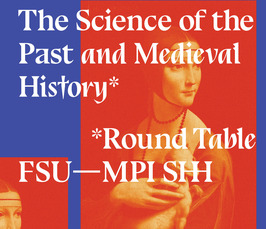"Science of the Past" and Medieval History
A joint Jena University-MPI workshop
- Date: Jan 9, 2020
- Time: 12:00 PM - 06:00 PM (Local Time Germany)
- Location: MPI SHH Jena
- Room: Villa V14
- Host: Palaeo-Science and History Group (PS&H)
- Contact: izdebski@shh.mpg.de

Programme
1. Sektion / Session 1 (Sprache: Deutsch)
Zwischen Archäogenetik und Geschichtsforschung: Genetic History in der Diskussion / Archaeogenetics and historical research: a debate on genetic history (Diskussionsleitung: Prof. Dr. Uwe Schirmer, Universität Jena)
12.00 – 12.10 Uhr Einleitung und Begrüßung
12.10 – 12.40 Uhr PD Dr. Jörg Feuchter (Berlin): Genetic History – Eine Herausforderung für die Geschichtswissenschaften
12.40 – 12.55 Uhr Dr. Wolfgang Haak (MPI): Über ‘pots equals people’ in der Vorgeschichte und warum dies vermeintlich manchmal funktioniert (German)
12.55 – 13.10 Uhr Dr. Stephan Schiffels (MPI): Neue Methoden und Erkenntnisse zur Europäischen Eisenzeit und Frühmittelalter aus der Genetik
13.10 – 13.30 Uhr Diskussion
13.30 – 14.30 Uhr Mittagspause (Buffet) / working lunch
2. Sektion / Session 2 (Language: English)
History between genetics and mathematics: studies into the dispersal of natural and cultural phenomena / Geschichte zwischen Genetik und Mathematik: Studien zur Ausbreitung von Natur- und Kulturphänomenen (Chair: Prof. Johannes Krause, MPI)
14.30 – 14.50 PD Dr. Robert Gramsch-Stehfest (Univ. Jena): „… pestis illa animarum”. Network analysis of the humanistic res publica litterarum and the spread of the Reformation ideas
14.50 – 15.05 Dr. Maria Spyrou (MPI): Tracing the initiation and progression of the second plague pandemic using ancient genomics
15.05 – 15.20 Dr. Kirsten Bos (MPI): Expect the unexpected: surprises from pathogen DNA screening of medieval skeletons
15.20 – 15.40 Diskussion
15.40 – 16.00 Uhr Kaffeepause / coffee break
3. Sektion / Session 3 (Language: English)
Climate and Environment: approaches from the humanities and the natural sciences / Klima und Umwelt: geistes- und naturwissenschaftliche Ansätze (Chair: Prof. Dr. Marcin Wołoszyn, GWZO Leipzig)
16.00 – 16.20 Dr. Martin Bauch (GWZO Leipzig): New questions and methods in the study of medieval catastrophes and climatic changes
16.20 – 16.45 Dr. Adam Izdebski (MPI): Environmental science and history: palynological data as historical evidence
16.45 – 17.00 Dr. Ricardo Fernandes (MPI): Implementing interdisciplinary research approaches for the study of the human past within the Pandora and IsoMemo Big Data initiatives
17.00 – 17.20 Diskussion
17.30-18.00 Schlussdiskussion / final discussion (Diskussionsleitung: PD Dr. Robert Gramsch-Stehfest und Dr. Adam Izdebski)